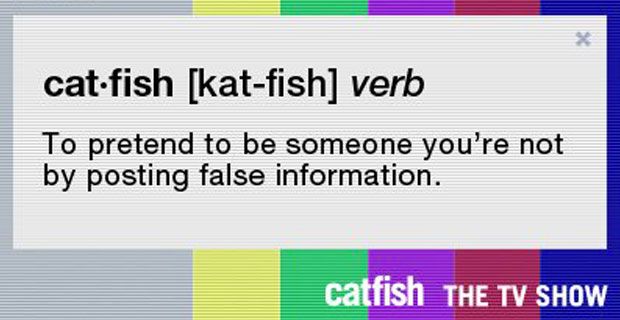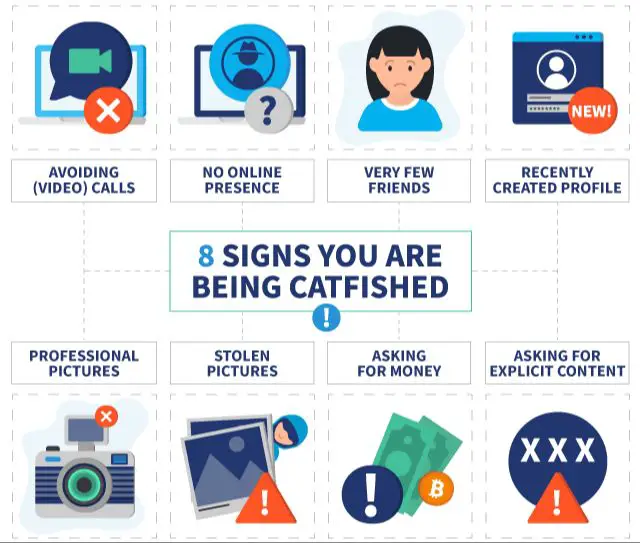What is catfishing?
Catfishing refers to the practice of creating a fake online identity or persona in order to deceive and trick other people, typically for malicious purposes. The term originated from the 2010 documentary film Catfish, which followed a man who discovered the woman he had been interacting with online was not who she claimed to be [1].
Online catfish will use stolen or fake information, photos, and details to build an elaborate and completely fabricated identity. They will then initiate relationships through social media, dating apps, forums, and other online platforms while posing as their fictional persona. Catfish pretend to be someone else in order to manipulate, take advantage of, or scam other internet users [2].
Some common elements of catfishing include using someone else’s photos as their own, creating fake social media profiles, lying about details like their name, age, location, job, interests, and more. Catfish put a lot of time and effort into making their fake identities seem real, which makes their victims much less likely to suspect they are being deceived and manipulated [3].
Common motivations for catfishing

There are various reasons why someone may engage in catfishing. Some of the most common motivations include:
Romance/money scams – Catfishers may create fake online identities to try to seduce or manipulate people into sending them money. They often target vulnerable or lonely people looking for love and affection. According to the USAToday article, over $300 million is lost to romance scams each year.1
Boredom – Some people catfish simply because they are bored and find it entertaining to live a fantasy life online. It can be an escape from their daily routine. The thrill of adopting a fake persona may provide excitement for them.
Revenge – Catfishing can also be used as a means of getting revenge on someone by targeting their friends/family or trying to ruin their reputation. The catfisher may have a personal grudge and uses fake identities to spread lies or manipulate others against the person.
Stalking – More malicious catfishers use fake accounts to stalk people online. By pretending to be someone else, they can follow all of the target’s activity on social media and elsewhere. This allows them to keep tabs on the person for obsessive or predatory reasons.
Warning signs you may be getting catfished

There are several common red flags that indicate you may be getting catfished by someone online. Some key warning signs include:
Refusing to video chat – If the person constantly makes excuses for why they can’t video chat, such as their camera is broken, this is a major red flag. As Avast notes, avoiding video calls is one of the top signs of a potential catfisher.
Won’t meet in person – Similarly, if they keep coming up with reasons why they can’t meet up in real life, like being too busy with work or family emergencies, they may be deceiving you about who they really are.
Inconsistencies in their story – If details about their life, job, location, family etc. don’t add up or seem to change, this could mean they are lying and having a hard time keeping their story straight.
Using fake or suspicious photos – Doing a reverse image search on their photos could reveal they are using someone else’s images. As WebMD notes, stolen or overly professional photos are a warning sign.
Asking for money/gifts – According to TeenVogue, catfishers will often ask for money for claimed expenses like travel costs to come meet you or emergency bills. Be very wary of anyone making these requests.
Reverse image search

Reverse image search using Google is a great way to check if the photos being used by a potential catfish are stolen from somewhere else online. Here’s how to do a reverse image search on your phone using the Google app according to Forbes:
- Open the Google app and tap the camera icon.
- Tap “Search with your camera” at the top.
- Take a photo of the image you want to search or upload a saved photo.
- Google will scan the image and show you web pages containing the photo.
You can also upload images to search via desktop at images.google.com. If the same photos show up elsewhere online attached to a different name, it’s likely you’re being catfished.
Ask specific questions
One of the best ways to uncover a potential catfish is to ask them detailed questions about their supposed life and see if their answers remain consistent. Ask for specifics about where they grew up, went to school, work, or who their family and friends are. A catfish may stumble over remembering details or provide contradictory information if they are fabricating an identity.
For example, ask questions like:
- What was the name of the street you grew up on?
- What activities did you do after school?
- What was your high school mascot?
- Where did you go for your last vacation?
- What is your sister’s name and where does she live?
A genuine person should be able to easily answer such questions about their own life experiences. But someone creating a fake persona may have difficulty keeping all the details straight over time. Continually asking for specifics can help reveal inconsistencies and fabrication.
According to experts, consistently asking for details about someone’s real life is one of the best tactics for uncovering catfish before becoming too emotionally invested (Source: https://www.webmd.com/sex-relationships/signs-catfishing). So if something seems suspicious, start asking questions and see if their story checks out.
Do your own background check
One of the best ways to verify someone’s identity and spot red flags is to do your own background check. Search their name, location, school, job etc. to fact check the details they’ve told you. Look for any social media accounts tied to their name and see if you can match up photos, posts, and biographical information.
Run searches on sites like Social Catfish, SearchBug, and BeenVerified to uncover any criminal records, address history, marriages, aliases, and other useful information. While full background checks usually cost money, you can find a wealth of public records online for free if you dig deep enough.
Compare what you learn from public records to what the person has told you about themselves. Any major inconsistencies could be red flags for catfishing. Trust your intuition if their story doesn’t add up.
Trust your instincts

If something seems suspicious, it probably is. Don’t ignore any red flags. As the old saying goes: “If it seems too good to be true, it probably is.” Your gut instinct is there for a reason. According to one Quora user, their intuition kicked in while chatting to someone on a dating site who later turned out to be catfishing them: “Yes! There was a guy that I started chatting to for a bit and eventually he asked me to come on his boat with him for the first date.”
While you can’t judge a book by its cover, first impressions provide important clues. Pay attention to any feelings telling you something is off. As relationship experts explain, trusting your intuition is key: “In theory, this advice seems relatively straightforward. However, what makes it complicated is that our intuition is clouded by past hurts, fear, desire, and false narratives.”
Rather than ignoring any suspicions, take pause. Politely confront the person to confirm details about themselves. And don’t feel bad about verifying someone’s identity or pressing for clear answers. Protecting yourself is the priority.
Confronting a catfish
If you suspect someone of catfishing you, it’s important to confront them directly according to WikiHow. However, be prepared for them to become defensive or angry when accused of lying about their identity.
Experts recommend gathering solid evidence of catfishing before confronting them. For example, you can do a reverse image search on their photos or look up information about their alleged background that doesn’t add up. Having evidence makes it harder for them to deny the accusations.
When confronting a catfish, be direct but also compassionate according to SearchBug. Say something like “I care about you, but I’m having a very hard time believing you are who you say you are. I hope you can understand why I feel this way.” This gives them a chance to come clean or provide an explanation.
Regardless of their response, make it clear the false identity is unacceptable and you want the truth. If they deny catfishing, reiterate your stance and say you cannot continue the relationship without complete honesty. Be prepared to end the relationship if needed.
Reporting catfishing
If you discover you’ve been catfished, you have options for reporting the fake profile or scam depending on the platform or app used:
On Facebook, you can report a fake profile directly through the platform. Provide details on why you believe the profile is fake.
For Instagram, tap the three dots above the profile, select “Report”, and then choose “Pretending to be someone”. Supply additional information to submit the report.
On dating apps like Tinder or Bumble, open the user’s profile, tap the three dots or report button, and select to report them. Share specifics on the impersonation or scam.
For texting or messaging scams, you can report an imposter on WhatsApp, or file a complaint with the FTC at ReportFraud.ftc.gov.
If money was exchanged, you should also file a report with your local police department so there is an official record. Provide screenshots and details on the scam and fake profile.
Protecting Yourself
There are several steps you can take to protect yourself from being catfished:
- Be very cautious about sharing personal information like your full name, address, phone number, or financial details with someone you met online, even if you feel you know them well. Scammers will try to gather information to steal your identity or money (Source: https://www.malwarebytes.com/blog/news/2022/06/5-ways-to-avoid-being-catfished).
- Make your social media accounts private so only approved friends can see your posts and profile details. Avoid accepting friend requests from people you don’t know (Source: https://seersco.com/blogs/the-5-most-effective-ways-to-avoid-social-catfishing/).
- Don’t send money to someone you only know online, no matter how convincing their story is. Many catfish scams involve asking for money for emergencies, travel, or other fictional needs.
- Use cybersecurity tools like VPNs and antivirus software to protect your devices and online accounts from hackers who could gather your information.
- Avoid sharing provocative photos online or through messaging apps, even with people you know and trust. Those images could be used against you by catfishers.
Being cautious and vigilant with your personal information and online interactions is the best defense against catfishing scams. Trust your instincts if something seems suspicious, and don’t hesitate to block or report catfish accounts.

